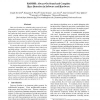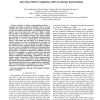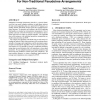3172 search results - page 27 / 635 » On the Random-Self-Reducibility of Complete Sets |
136
click to vote
ISCA
2012
IEEE
13 years 3 months ago
2012
IEEE
Data-race freedom is a valuable safety property for multithreaded programs that helps with catching bugs, simplifying memory consistency model semantics, and verifying and enforci...
142
click to vote
SIAMJO
2010
14 years 11 months ago
2010
This paper introduces a novel algorithm to approximate the matrix with minimum nuclear norm among all matrices obeying a set of convex constraints. This problem may be understood a...
ICDM
2010
IEEE
14 years 11 months ago
2010
IEEE
Consider a typical recommendation problem. A company has historical records of products sold to a large customer base. These records may be compactly represented as a sparse custom...
133
click to vote
AAAI
2012
13 years 3 months ago
2012
The study of transportability aims to identify conditions under which causal information learned from experiments can be reused in a different environment where only passive obser...
120
click to vote
ATAL
2007
Springer
15 years 7 months ago
2007
Springer
Distributed Constraint Optimization (DCOP) is a general framework that can model complex problems in multi-agent systems. Several current algorithms that solve general DCOP instan...



